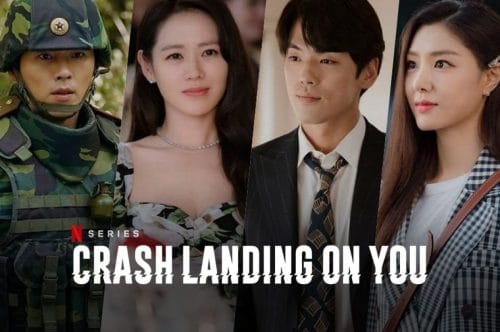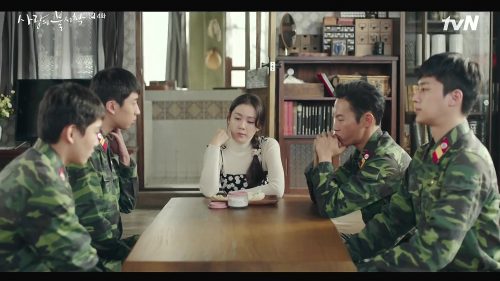K-drama review: Crash Landing On You

I know, it’s months since I last wrote a K-drama review and I choose now to come back but it’s not about Squid Game? Rest assured, I am watching Squid Game and a write-up will follow soon. But when that dropped I was halfway through this previous smash hit show. Crash Landing On You (TvN/Netflix 2019–2020) could not be more different. And I loved it.
Crash Landing On You has all the classic K-drama ingredients: a lead couple who are clearly destined to fall in love but whose circumstances make it impossible; a huge disparity in wealth; complicated power dynamics including a chaebol family where the father is retiring and choosing which child to name as his heir; nefarious villains who kill and kidnap at will; some really beautiful friendships that withstand tests of their strength; very cheesy romance and slapstick humour that are sometimes at odds with the rest of the plot.
So what makes Crash Landing On You different from other K-dramas? The obvious thing is that much of it is set in North Korea, and many of the lead characters are North Korean (though obviously the actors are South Korean and no filming took place in North Korea). I have never seen North Korea depicted in a K-drama before (possibly because South Korea has very strict rules about depicting North Korea in its media) but this felt like it was treading a fine line where it showed the infrastructure and political system in negative light but the people as for the most part good and generous.
Which all sounds very serious, but in the main this is quite a silly and sweet show. South Korean heiress Yoon Se-ri (Son Ye-jin) suffers a paragliding accident that lands her in the DMZ, at the North Korean end (which sounds ridiculous but this was apparently loosely based on a real-life event). She is found by a captain in the North Korean army, Ri Jeong-hyeok (Hyun Bin, from Secret Garden and Memories of the Alhambra) who, knowing that she will be taken in for questioning if he reports finding her, tries to direct her to a safe route south. But she gets lost and through a comedy of errors accidentally crosses the border into North Korea and hides herself in a house in the nearest village.
This, of course, turns out to be Captain Ri’s house. As he and his officers were supposed to be defending the section of the border that she crossed, they will now be in trouble if they turn her in. So they agree to hide her until they can find a way to send her home. As more time passes, they need a cover story in case she is seen by others in the village, so they claim she is Jeong-hyeok’s fiance who has been working as a spy in the South (to explain her accent). But this gets complicated when Jeong-hyeok’s actual fiance, Seo Dan (Seo Ji-hye, who had a role in Don’t Dare to Dream, my favourite K-drama), comes visiting from Pyongyang.
Meanwhile, back in Seoul, Se-ri’s father, president of the family business Queens Group, has just been released from jail and has decided it’s best for the company’s reputation if he stands down and names one of his three children as successor. His first choice was Se-ri, who doesn’t actually work for Queens Group but runs her own very successful fashion brand, Seri’s Choice. But hours after making that announcement privately to the family, she disappeared mysteriously. So now he must choose between his sons: Se-hyung who is money-grabbing and ruthless, potentially positive traits in business, but was recently conned out of a lot of Queens Group money; or Se-jun who is mostly a harmless idiot.
Se-hyung believes he can get that president position if he tracks down the man who conned him, Gu Seung-jun (Kim Jung-hyun, who also had a role in Don’t Dare to Dream). Seung-jun is street-smart and charming, with the additional benefit of holding a British passport, meaning he can hide out in almost any country – even North Korea, where he can pay corrupt officials to house him in luxury for a few years. But Se-hyung comes close enough to tracking him down that he stumbles across the knowledge that Se-ri is in North Korea. Will he help his sister get home or will he enlist local villains to keep her away for good?
That’s roughly the first two episodes out of 16, each of which is 80–110 minutes long. Which gives the show plenty of time for high-octane action (including car chases, shoot outs and big fight scenes), a plot filled with twists and turns, and character development. The lead couple’s relationship takes its time, despite being heavily telegraphed from the start. But it’s not just them who we get to know. Jeong-hyeok’s four officers are key from the start and though they do provide comic relief at times, are never exactly figures of fun, as their support and friendship is just too genuine to be silly.

Similarly, the women of Jeong-hyeok’s village provide a lot of comedy, especially the head of the village Na Wol-suk (Kim Sun-young who has been in Reply 1988, Because This is My First Life, Romance is a Bonus Book and When the Camellia Blooms so it’s no wonder I recognised her). But again, their friendships with each other and protectiveness towards “their” Captain Ri are too genuine and sweet to be a joke.
Apparently one of the show’s writers was a North Korean defector, and more North Koreans were consulted about every detail. But it still had to obey the law not to depict North Korea in a positive light, so it’s hard to know how accurate this depiction is (looking behind the silliness of the power play and paragliding accident). I can certainly believe that the North Korean elite live in luxury in Pyongyang, with lives that feel familiar to us in the West, while outside the city most people live in villages where they not only suffer rolling power cuts but also frequent inspections that prevent them from enjoying luxuries such as imported goods even when they can buy them under the counter at the local market. I suspect both the best and worst aspects of life in North Korea have been omitted from this show to instead concentrate on a roughly average day-to-day existence. It could even be argued that the lack of technology is depicted in a positive light, as groups of people work together convivially to create meals from scratch that we only ever see ordered ready-made in the Seoul sections of the show.
And to be fair, South Korea isn’t shown at its best or worst either. There aren’t many South Korean characters but most of them are money-obsessed. The product placement is as always super obvious (and at least 50% of it is Subway). The hospitals are well equipped and efficient where those in the North are lacking (though no mention of how expensive it is to go to hospital in the South, something that is addressed in Squid Game). Food and electricity are readily available, but loyalty to family and friends is largely non-existent (the few characters we actually get to know are super-rich, after all).
I think I enjoyed this show for a few reasons. One is the charm and chemistry of not only the lead couple but all of the main cast. I think it’s also key that the whole premise – that they can’t be together because their country was divided by a war before they were born – is bemoaned often; reunification is a common goal, albeit one that is tacitly accepted to be a pipe dream. This is a real, serious topic, one that is brought home in both subtle and unsubtle ways – for instance, referencing how Seoul and Pyongyang are experiencing the same weather because they are physically so close. But this seriousness, as well as the crime aspects of the plot and moments when a life is endangered, is all balanced by romance, humour and slice-of-life drama that have a positive, sunny outlook on life.
This is not by any means realism, but I think the silliness is key to give the show’s makers licence to take on a topic so rarely explored. And the gamble clearly worked as this is the third highest-rated South Korean TV drama in cable television history.